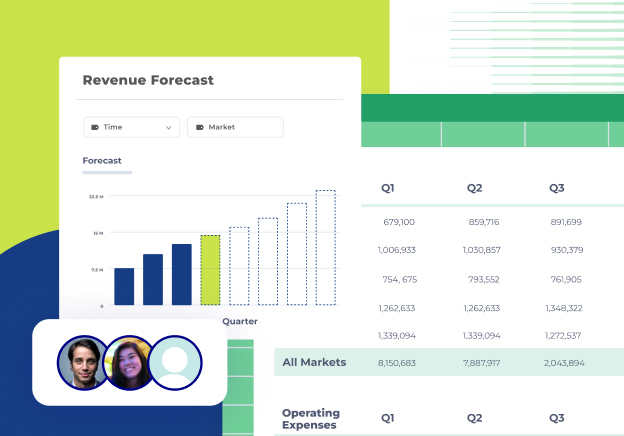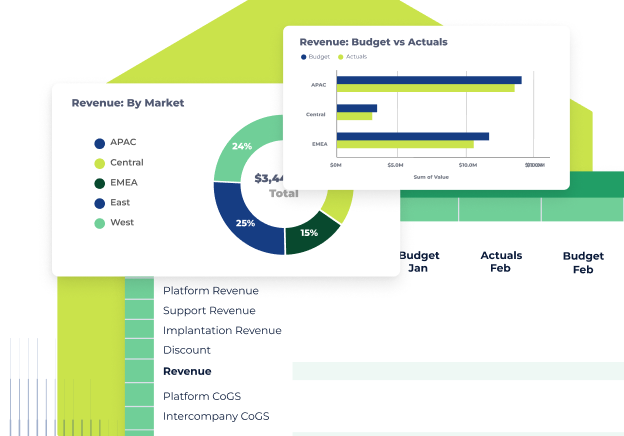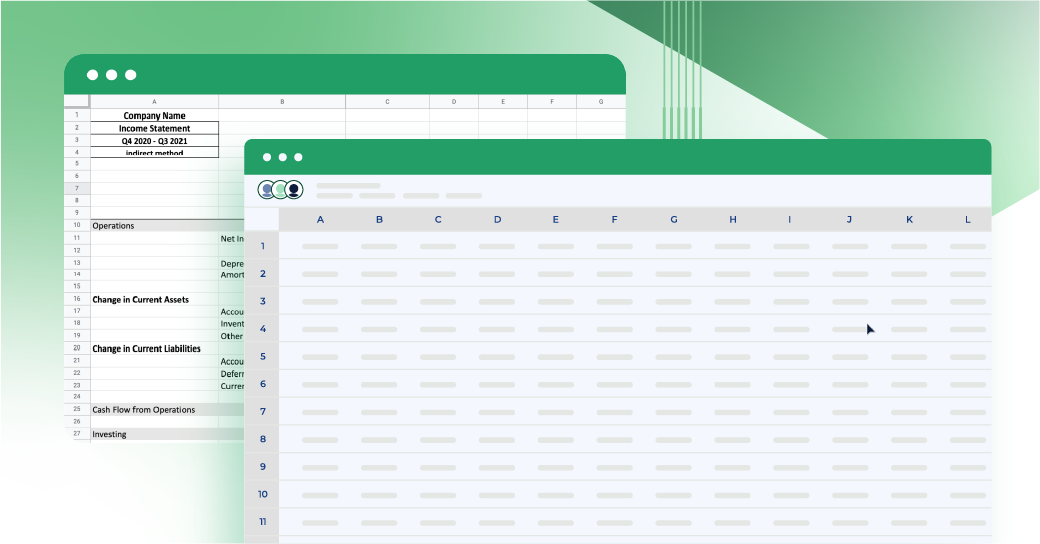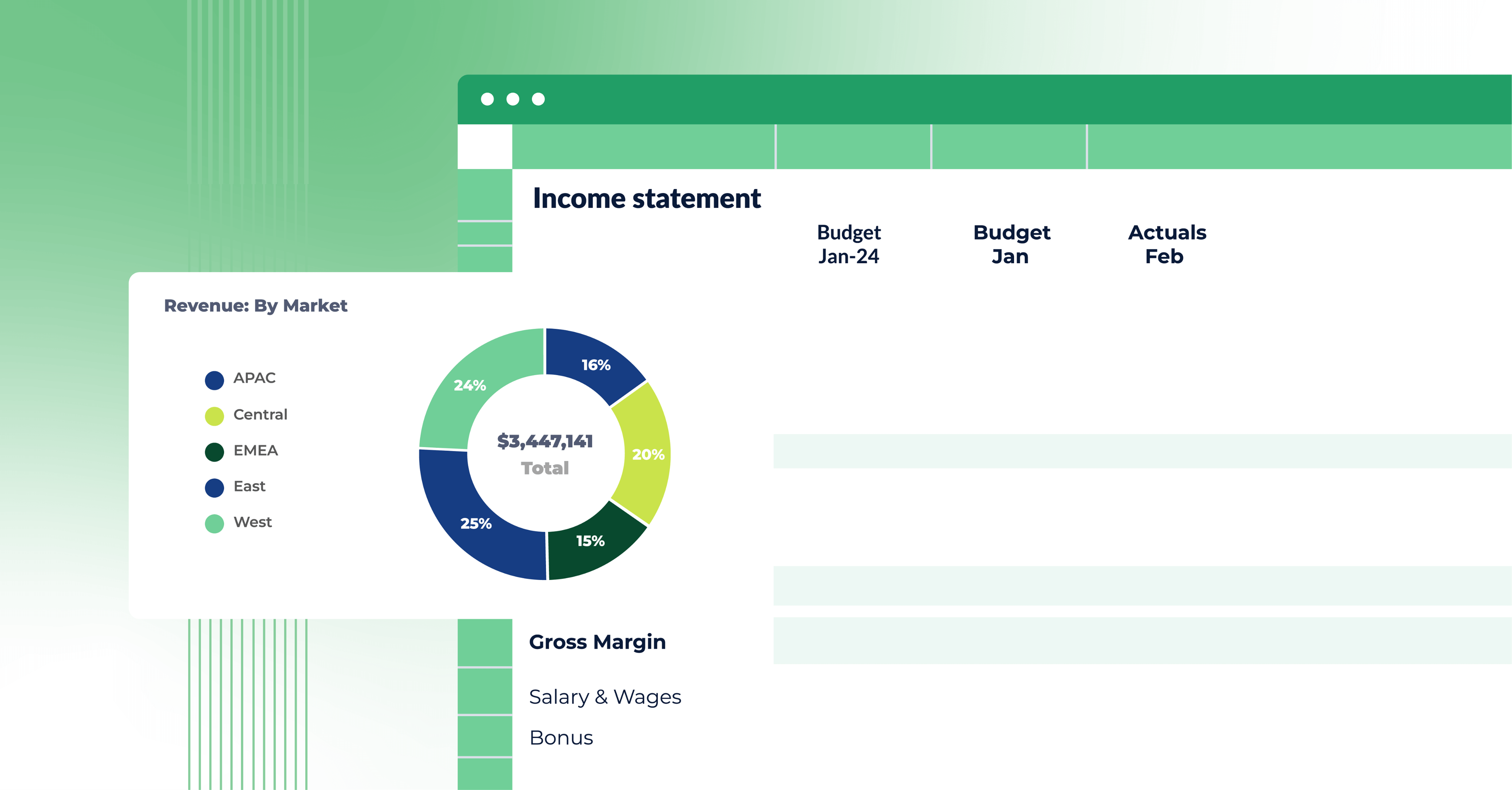What is financial leadership?
When we hear about finance leaders, we typically think of the CFO role.
And while the CFO is an essential member of the finance team, as they lead the finance department, you can still be a great financial leader in an FP&A manager role or in an advisory role.
Because here's the kicker:
As a finance team member, you're responsible for interpreting a company's financial data to develop strategic plans and recommend sound financial decisions.
In other words: the financial success of the company---and all the jobs of the employees who work there, plus all the goodness your company's customers get from doing business with the company---depends on finance teams.
The rise of the strategic CFO
However, in recent years the role of the CFO has become more strategic. CFOs must partner with CEOs, COOs, and other executive team members to drive a company's holistic financial planning.
While the finance function is responsible for a litany of tasks, including:
- Understanding the business model
- Preparing detailed management reports and financial reports
- Working with business owners, the board of directors, and the C-suite staff
- Setting policies around payroll and controls
- Managing cash flow
- Remaining compliant with government agencies
- Forecasting scenarios and recommending key business decisions
- Creating the annual budget
- Improving a company's financial operations
- and so on,
the CFO and the finance department need to collaborate in other key business functions where they can make a difference, such as with People Operations regarding conversations about new hires, compensation, and employee retention and attrition.
An increasing interest in financial analytics
A financial leader needs to know her numbers to provide actionable insights and make sound financial recommendations to the rest of the management team.
You should know the answers to questions like:
- Where is your data coming from?
- How do you and your team ensure your data is accurate?
- How much time are you spending each week on data analysis?
- What's keeping you from spending more time on data analysis?
- What metrics are you reporting on?
- Which metrics are you not reporting on?
- Which financial ratios does your board of directors care about?
- How is your team forecasting?
- What tools are you currently using to collect, analyze, and visualize data?
- What pain points still exist regarding those tools?
- How are you improving financial transparency across the company?
- How can you enable department leaders and budget owners to better adhere to their budgets?
- How has the company been creating the annual budget? What tweaks could you make?
- How are we using AI or predictive analytics to improve our forecasting?
And so on.
If your team is like most finance teams, they spend a lot of time in Excel.
And while advanced spreadsheet skills are essential for finance professionals, complementing Excel with a spreadsheet-native FP&A platform like Cube will only serve to improve your team's productivity.

What are the 5 traits of the best finance leaders?
The best financial leaders understand how promoting collaboration between departments can improve a company's financial performance.
Here are 5 key traits of the best finance leaders:
1. Build and drive the strategic vision
Where is the company headed?
You should have financial goals to meet like ARR, retention rate, and net income.
But you should also have a bigger vision. What's the context for hitting a new ARR milestone? What's the greater impact that the company makes in the world?
You'll likely spend a lot of time talking with your CEO and company founders to come to this conclusion.
2. Collaborate across departments
You should take a holistic view of a company's finances.
What story do the numbers tell?
What questions do department leaders or managers have about their budgets?
The people on the ground often have informed opinions about the allocated budgets. You should do your best to understand those opinions.
3. Help the entire company understand the numbers
Most people who aren't in finance only have a rudimentary understanding of these numbers.
And in many companies, the finances aren't visible at all.
So share them.
Create a simple financial statement (without jargon like EBITDA, amortization, PP&E, and so on) for the company to understand.
It can be as simple as revenue and expenses. Or percent growth compared to the previous period.
4. Show how day-to-day work affects the bottom line
Employees will be more invested in the company's financial goals if they understand how their work affects revenue.
The top-down OKR model is a great way to clarify this connection.
But you can also meet with department leaders, help them understand their team's impact, and encourage that conversation to trickle down.
Alternatively, you can spotlight teams, employees, and projects whenever you get the chance to present to the company and show by example how they make a contribution to the company's finances.
5. Plan, plan again, and plan again
You need to be resilient to change. And that means making plans.
Scenario planning is one of your best tools.
Never be in a position where you're asked a question about a potential future and don't have a plan.

The 6 things financial leaders should do in a new role
Your focus now is determining what’s most important, what’s working and not working, and where you can spend your time to have the most influence and make the most impact.
So where to begin? The first 90 days of any new role are crucial as you learn, gather data, and build a plan.
These 6 recommendations will guide you toward success in your new Finance leadership role.
1. Perform your own audit
Understanding your business's financial state is critical for a finance leader, so start there.
Dig deeply into the financial and operational metrics and weigh them against the business's strategic priorities. The strategy and priorities depend on the company's size, industry, and stage. Your company might focus on hyper-growth, cutting costs, or controlling EBITDA.
Review your company's financial statements, even beyond the usual big three suspects of the income statement, balance sheet, and statement of cash flow, to understand your reporting. What are the gaps? What story do these reports tell?
The as-is business situation will give you a better understanding of what you need to do and the effort required to get there, so use the data to determine gaps, identify challenges, and find opportunities to improve your odds of success.
2. Assess your finance team
You’ll only be as successful as the people, processes, and technology on your team allow you to be. Your new role gives you a better perspective on what’s really important, what can be improved, and what’s blocking your potential. Address gaps early before they become challenges.
Invest in your existing team: what are their strengths, and what are their gaps? How do they want to grow in their careers? What are their opinions on the company's financial health, and what data are they studying to arrive at those conclusions?
After that, you can also bring in new hires, re-architect key processes, and find new technology to fuel your early wins.
Data, analytics, and insights drive Finance in 2023, and flexible, modern FP&A solutions like Cube give you the power and agility to work faster and smarter. They also give Finance more accuracy and confidence, which turns into more progress and success for you and your company.
3. Build bridges into the business
Finance is the hub of any business.
And that means you must rely on strong, collaborative relationships with peers and leaders across the business to do your job well. This includes pulling data from the business and pushing insights back to the business to inform their plans and guide their actions.
Take time now to build or strengthen your connections to every business area, automate data gathering, and infuse easy collaboration technology into those relationships.
Remember: you’re there to help your business partners be successful.
Do so by speaking their language, streamlining the budgeting, planning, and other interactions with Finance, and showing them you’re there to make them successful.
4. Develop your plan
Now it’s time to craft a plan of action.
Based on your assessment, prioritize 2-3 business metrics you can improve or high-impact initiatives you can deliver fast.
Don’t try to do everything all at once. It’s better to do a couple of things really well than to do a bunch of things that never quite finish. Make sure to get buy-in from the business by explaining how your initiatives will benefit them and help achieve the company’s strategic priorities.
Early wins will build credibility and trust, and give you more influence on day 90 and beyond.
5. Communicate regular progress with data
Your success relies on the CEO and the other business leaders recognizing your progress, so make it easy for them to understand.
Metrics are the common language of business, but you’ll need to tell a story that explains the progress, expectations, and benefits in simple terms, not financial jargon. Be the storyteller who adds the context of vision, priority, timeline, and achieving c-suite goals.
Also, remember that technology is your friend. Make everything easier and faster with business software to automate reporting, provide access to deeper analytics, and increase accuracy, so you can craft your story quickly, clearly, and confidently.
6. Capitalize on your clean slate
A new leader brings with them the opportunity to take a new approach, transform Finance, and make significant moves.
It’s your time to wipe the slate clean and take control. That gives you a lot of leeway to reevaluate how Finance and the broader business operates. It can be an opening to influence areas like corporate culture, health and wellness, innovation, diversity and sustainability, and more.
But, being a Finance leader, anything you propose must be backed up with data to make your case, justify investments, and forecast returns. So make sure you have the solutions and technology in place now to support your initiatives later.
Conclusion: look well beyond day 90
Stepping into a finance leadership role is a big responsibility, but following these best practices will prepare you for it.
Remember that you can only do as well as your people, processes, and technology allow, so work on those first.
Then use your storytelling skills to put the data to work, guiding the business and reinforcing your success.



.png)








.png)






